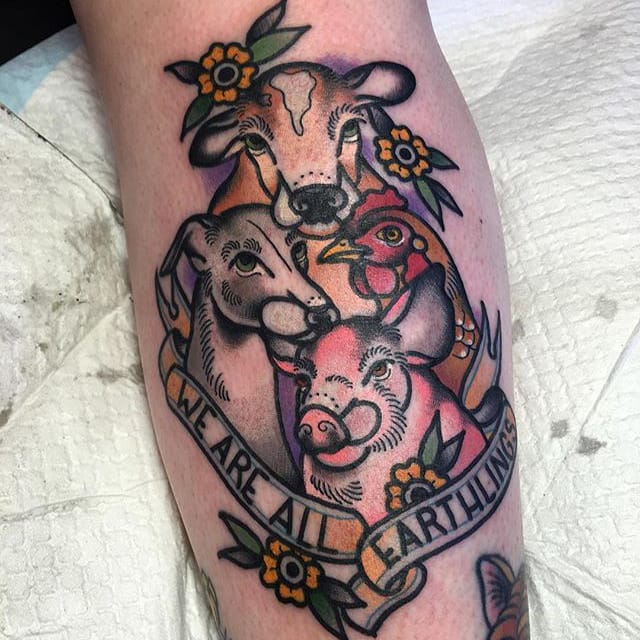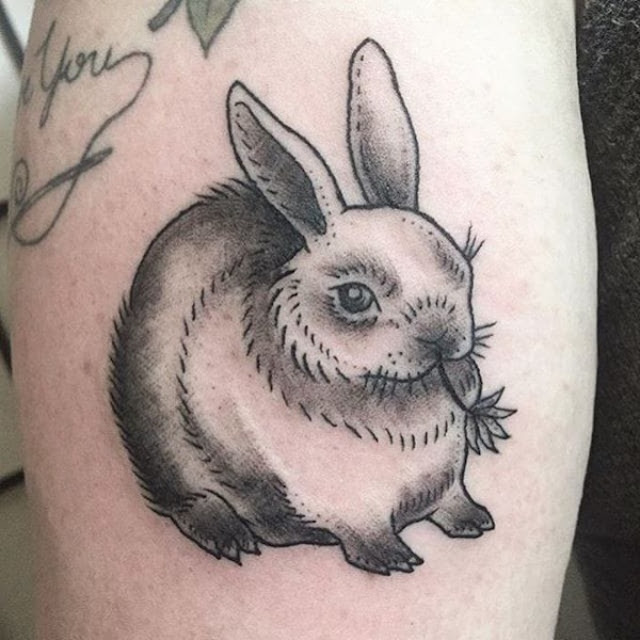Vegan Tattoo Shops Offer Cruelty-Free Body Art
We spoke with Dina DiCenso, owner of Gristle Tattoo, about how to combat animal testing in the industry and aid in ethical responsibility.

on
Stories
Tattoo shops are the latest frontier in the vegan movement, and whether or not you’re vegan, we think it’s safe to say that we should all probably be a little bit better about knowing what is being used on or in our bodies. If you’re anything like us, you probably haven’t given two thoughts as to what may or may not be in your tattoo ink, and whether or not the shop you’re at is totally vegan friendly. It’s not something that normally crosses people’s minds, and understandably so, if you’re not ingesting a food item or wearing leather, but everything from the razors to the soap used in shops can contain animal byproducts.
Gristle Tattoo in Williamsburg, Brooklyn, is one of the premier 100% vegan tattoo shops in New York. The shop’s founder, Dina DiCenso, says that she’s not surprised most clients aren’t aware of what exactly goes into the making of a tattoo. Interestingly enough, most modern inks are vegan to begin with, so where do you run into problems? “It's the soap, ointment, stencil paper and razors,” says DiCenso. “The industry standard green soap contains animal based glycerin. Ointments and other soaps can also contain animal based glycerin or lanolin. Regular stencil paper has lanolin to hold the ink to the plastic and razors may have a moisture strip that contains lanolin or animal based glycerin.”
In case you’re worried about the fade out or how the tattoo will wear over time when vegan ink is used, DiCenso says not to worry, as most vegan inks actually wear better than those that aren’t vegan. The technology used to make vegan ink is actually newer in comparison, although much like non-vegan ink, the longevity and fade out depends on the person’s skin. “If the wearer is a sun worshipper and doesn't protect their tattoo, it will fade no matter what kind of ink it is,” she says. “Everybody's skin is unique and will react to having ink in it differently.”
Ultimately the real problem with non-vegan products found in most tattoo shops is the ethical questions that are raised in regards to animal testing and byproducts. Glycerin, which is found in many soaps, is an animal byproduct made from tallow or animal fat. Lanolin, another common ingredient that’s most often used in lotions or ointments, is derived from sheep skin. Another concern is that oftentimes animals are forced to undergo extensive testing of products.
“Some non-vegan products are tested on animals despite the FDA not requiring testing,” says DiCenso. “[The manufacturing companies] just believed that people would be more likely to buy it if it had the ‘FDA tested’ stamp on it despite that stamp indicating nothing about how the product works, it only means it didn't kill or seriously injure the bunny or beagle they tested it on. It may have injured them, but not enough by the FDA's guidelines.”
Even if you’re not vegan, one should be mindful and conduct proper research before getting tattooed.
“Especially when vegan products are of a higher quality than the tortured animal versions. Animals are not food or inputs for consumer goods. They're intelligent, complex beings and they shouldn't have to lose their life so someone can have 10 seconds of happiness.”
Knowing what’s going on or in your body is just as important as knowing your artist. It’s hard to say for certain, but we’re pretty sure the sheep and cows will thank you, too.
Gristle Tattoo in Williamsburg, Brooklyn, is one of the premier 100% vegan tattoo shops in New York. The shop’s founder, Dina DiCenso, says that she’s not surprised most clients aren’t aware of what exactly goes into the making of a tattoo. Interestingly enough, most modern inks are vegan to begin with, so where do you run into problems? “It's the soap, ointment, stencil paper and razors,” says DiCenso. “The industry standard green soap contains animal based glycerin. Ointments and other soaps can also contain animal based glycerin or lanolin. Regular stencil paper has lanolin to hold the ink to the plastic and razors may have a moisture strip that contains lanolin or animal based glycerin.”
In case you’re worried about the fade out or how the tattoo will wear over time when vegan ink is used, DiCenso says not to worry, as most vegan inks actually wear better than those that aren’t vegan. The technology used to make vegan ink is actually newer in comparison, although much like non-vegan ink, the longevity and fade out depends on the person’s skin. “If the wearer is a sun worshipper and doesn't protect their tattoo, it will fade no matter what kind of ink it is,” she says. “Everybody's skin is unique and will react to having ink in it differently.”
Ultimately the real problem with non-vegan products found in most tattoo shops is the ethical questions that are raised in regards to animal testing and byproducts. Glycerin, which is found in many soaps, is an animal byproduct made from tallow or animal fat. Lanolin, another common ingredient that’s most often used in lotions or ointments, is derived from sheep skin. Another concern is that oftentimes animals are forced to undergo extensive testing of products.
“Some non-vegan products are tested on animals despite the FDA not requiring testing,” says DiCenso. “[The manufacturing companies] just believed that people would be more likely to buy it if it had the ‘FDA tested’ stamp on it despite that stamp indicating nothing about how the product works, it only means it didn't kill or seriously injure the bunny or beagle they tested it on. It may have injured them, but not enough by the FDA's guidelines.”
Even if you’re not vegan, one should be mindful and conduct proper research before getting tattooed.
It's important to use vegan products because there's no need to be exploiting animals for tattoos, or in any other areas of daily life.
“Especially when vegan products are of a higher quality than the tortured animal versions. Animals are not food or inputs for consumer goods. They're intelligent, complex beings and they shouldn't have to lose their life so someone can have 10 seconds of happiness.”
Knowing what’s going on or in your body is just as important as knowing your artist. It’s hard to say for certain, but we’re pretty sure the sheep and cows will thank you, too.













